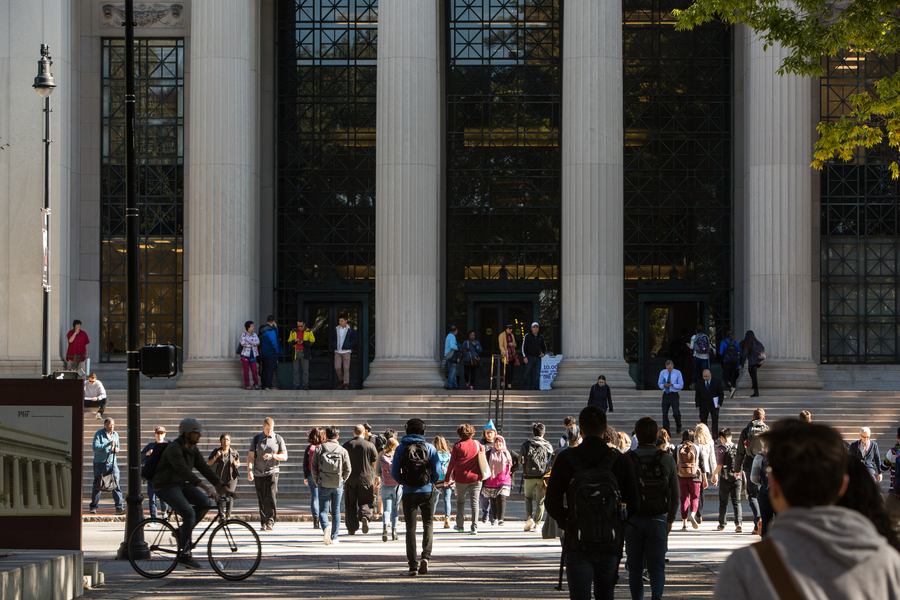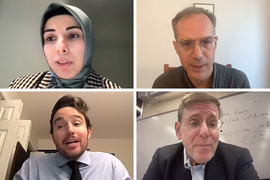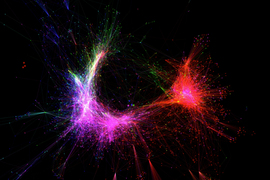On Nov. 14, President Sally Kornbluth launched Standing Together Against Hate (STAH), a community-driven initiative coordinated by Chancellor Melissa Nobles. The initiative will support efforts led by MIT faculty, staff, students, and the administration to come together, MIT-style, to use our problem-solving skills to address antisemitism, Islamophobia, and other forms of hate. Chancellor Nobles spoke with MIT News about the early efforts she is seeing — both at the grassroots level and institutionally — in support of this effort.
Q: What is your vision for STAH? And what traits of the MIT community do you think will be most essential to its success?
A: I've been at MIT for 27 years, and I’ve seen time and time again the initiatives that work best are the ones that emerge from the ground up, and that people are deeply invested in.
Hateful actions, whatever the motivation, cannot be addressed by leadership alone. Instead, dealing effectively with hate will involve all of us, fostering innovative, collaborative, MIT-specific offerings embedded in our day-to-day lives. Senior leadership can offer strategic cultivation and support along the way.
I see three organizing principles as essential to our community’s success in this moment, tied to pillars of our MIT Values Statement:
- Excellence and curiosity: We are an Institute full of smart people who excel at solving problems — but we first need to name the problem we’re aiming to solve. To be clear, that problem isn’t the ongoing war between Israel and Hamas; that is a deep-rooted geopolitical conflict. The problem we are trying to address is the elevated tension on campus right now.
- Openness and respect: To address this tension, we need to be able to turn toward each other and talk to each other — not over and against each other.
- Belonging and community: We want our community to continue to be a place where everyone feels welcome and is able to pursue their interests and passions.
Q: So, concretely, what efforts will the administration be undertaking?
A: The administration is taking a number of steps to start.
For example, members of Academic Council, which includes MIT’s senior leaders and the chair of the faculty, will be undertaking training on antisemitism as well as Islamophobia in the coming semester. Our DEI staff, many of whom have already had such training, will also be taking a refresher program.
Over Independent Activities Period, with a commitment of $50,000 from President Kornbluth, we will pilot a Faculty Community Seed Fund to encourage community-building efforts among faculty. Though proposals on all topics will be considered, those addressing antisemitism and Islamophobia on campus will be especially encouraged.
And we are planning a speaker series exploring these issues.
Human Resources has recently offered two new webinars for staff, postdocs, and faculty on navigating uncertainty and fostering a compassionate community.
Offices that work with our students are also leading the way. The Division of Student Life (DSL) and the Undergraduate Advising Center, for example, are enhancing undergraduate orientation programs during students’ first year to cover antisemitism and Islamophobia, and are taking steps to ensure that this education continues throughout students’ time at MIT.
DSL has also engaged with MIT’s Center for Constructive Communication (CCC), which is providing tools and methods through its community-based RealTalk@MIT initiative to promote authentic and nuanced dialogue among students in their dorms. In addition, CCC senior staff and advisors with expertise in dialogue facilitation and conflict mediation have been providing advice and assistance to MIT faculty and staff dealing with current campus tensions.
Q: Beyond the administration, what sorts of promising activities are underway at MIT right now, or might bear fruit later?
A: So much is getting underway, thanks to members of the community. My role is to provide support where it is requested and to help make the community aware of these efforts. Many of these ideas can serve as models for other groups across campus too.
First, many of our faculty, alumni, and DLCs [departments, labs, and centers] are taking the initiative to help community members inform themselves about the broader context. For instance, the Center for International Studies has organized a three-session online course on the Middle East crisis, running from Nov. 29 to Dec. 13, that is open to the MIT community, including alumni. The course is taught by Peter Krause PhD ’11, a political scientist at Boston College and a research affiliate in MIT’s Security Studies Program, who is an expert on Middle East politics.
At MIT Sloan, Professors Ezra Zuckerman and Ray Reagans are launching a podcast, called “The We and They in Us,” that explores group identities and how they affect our sense of community, with a particular focus on members of the MIT community affected by the current crisis in the Middle East.
And a group of dedicated faculty is engaging in direct outreach to students and to their fellow faculty; hundreds of members of our community have already signed their letter, pledging to work together to build a better future for MIT.
Students themselves are leading or helping to lead several efforts. The forthcoming Student Belonging Coalition, a joint effort of DSL, the Institute Community and Equity Office, and students, will coordinate efforts to deliver programs and events in our residence halls and student spaces, focused on the art of navigating difficult conversations and communicating effectively across differences.
The Undergraduate Association’s (UA) focus is on facilitating constructive interactions among students. UA leaders have been meeting with student groups on both sides of the conflict to determine how to best support everyone on campus, and they are committed to communicating the feedback they receive to the administration, to help inform campus initiatives.
Finally, the Graduate Student Council is equipping its departmental representatives to thoughtfully engage on these sensitive subjects with the students they represent. They are keeping their reps informed through meetings and encouraging them to communicate upward about any emerging concerns about the climate on campus.
We’re impressed with the range of activity across the Institute, and we want to keep it going. If your organization is mounting its own effort to combat antisemitism, Islamophobia, or other forms of hate, let us know! We invite you to write to us at stah@mit.edu.








